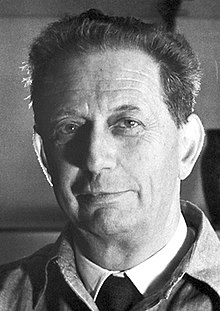André Michel Lwoff
André Michel Lwoff | |
|---|---|
 André Lwoff | |
| Born | 8 May 1902 Ainay-le-Château,Allier,France |
| Died | 30 September 1994(aged 92) |
| Alma mater | Pasteur Institute |
| Known for | Provirusinfection of bacteria |
| Spouse | Marguerite Lwoff |
| Awards | |
| Scientific career | |
| Fields | Microbiology |
| Institutions | |
André Michel Lwoff(8 May 1902 – 30 September 1994)[1][2][3]was a FrenchmicrobiologistandNobel laureateof Russian-Polish origin.
Education, early life and career[edit]
Lwoff was born inAinay-le-Château,Allier,inAuvergne,France, into aJewish[4][5]family, the son of Marie (Siminovitch), an artist, and Solomon Lwoff, a psychiatrist.[6]He joined theInstitute Pasteurin Paris when he was 19 years old. In 1932, he finished his PhD and, with the help of a grant from theRockefeller Foundation,moved with his wife and co-researcherMarguerite Lwoffto theKaiser Wilhelm Institute for Medical ResearchofHeidelbergtoOtto Meyerhof,where he did research on the development offlagellates.Another Rockefeller grant allowed him go to theUniversity of Cambridgein 1937. In 1938, he was appointed departmental head at theInstitut Pasteur,where he did groundbreaking research onbacteriophages,microbiotaand on thepoliovirus.
Awards and honors[edit]
He was awarded numerous prizes from the FrenchAcadémie des Sciences,theGrand Prix Charles-Leopold Mayer,theLeeuwenhoek Medalof theRoyal Netherlands Academy of Arts and Sciencesin 1960 and theKeilinMedal of the BritishBiochemical Societyin 1964. He was awarded aNobel Prize in Medicinein 1965 for the discovery of the mechanism that some viruses (which he namedproviruses) use to infectbacteria.[6]He was an elected member of the United StatesNational Academy of Sciences,theAmerican Academy of Arts and Sciences,and theAmerican Philosophical Society.[7][8][9]Throughout his career he partnered with his wifeMarguerite Lwoffalthough he gained considerably more recognition. Lwoff was elected aForeign Member of the Royal Society in 1958.[1]Lwoff was also president of theFEMSfor a term of two years from 1974. The FEMS-Lwoff Award in microbiology is named in his honour.[10]
Personal life[edit]
Lwoff was married to the microbiologist and virologist Marguerite Lwoff with whom he published many works. He was also ahumanistagainstcapital punishment.[11]
See also[edit]
References[edit]
- ^abcJacob, F.; Girard, M. (1998). "Andre Michel Lwoff. 8 May 1902-30 September 1994".Biographical Memoirs of Fellows of the Royal Society.44:255–263.doi:10.1098/rsbm.1998.0017.ISSN0080-4606.PMID11623983.S2CID30313937.
- ^Shafrir, E. (1996). "Jacques L. Monod, Francois J. Jacob and Andre M. Lwoff--introducers of new dimensions in cellular genetics and molecular biology".Israel Journal of Medical Sciences.32(2): 162.PMID8631654.
- ^"André Lwoff - Biography".Nobelprize.org.1965.Retrieved2013-05-24.
- ^"André Lwoff, Nobel Prize in Physiology or Medicine in 1965".geni_family_tree.8 May 1902.Retrieved2023-03-30.
- ^"Jewish Nobel Prize Winners in Medicine".www.jinfo.org.Retrieved2023-03-30.
- ^abSullivan, Walter (1994-10-04)."Andre Lwoff, 92, Biologist, Dies; Shared Nobel for Study of Cells".The New York Times.ISSN0362-4331.Retrieved2013-05-24.
- ^"Andre Lwoff".www.nasonline.org.Retrieved2022-09-22.
- ^"Andre Michel Lwoff".American Academy of Arts & Sciences.Retrieved2022-09-22.
- ^"APS Member History".search.amphilsoc.org.Retrieved2022-09-22.
- ^"FEMS-Lwoff Award".
- ^Michel Morange (2005)."What history tells us III. André Lwoff: From protozoology to molecular definition of viruses".p. 593.Retrieved23 April2017.
His culture was not limited to biology: André Lwoff was a humanist (Lwoff 1981).
External links[edit]
- André Lwoffon Nobelprize.org
- 1902 births
- 1994 deaths
- Nobel laureates in Physiology or Medicine
- French Nobel laureates
- People from Allier
- Members of the European Molecular Biology Organization
- French humanists
- French microbiologists
- French virologists
- Phage workers
- Foreign Members of the Royal Society
- Members of the French Academy of Sciences
- Foreign associates of the National Academy of Sciences
- Leeuwenhoek Medal winners
- Pasteur Institute
- Presidents of the International Union of Microbiological Societies
- Members of the American Philosophical Society
